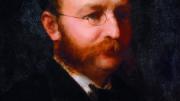Harvard's first professor of music was born in Portland, Maine, where his father led the town band, owned the music store, and published music. A local composer, a German immigrant, taught young John Knowles Paine the organ, and the boy soon excelled at the keyboard. It became clear that he would need greater educational opportunities to nurture his talent--but the Great Fire of Portland destroyed the family's business in 1856 and his father died shortly thereafter. Benefit concerts provided a solution, attracting favorable critical attention from as far away as Boston and raising sufficient funds for Paine to set sail for Berlin in the summer of 1859.
There he spent three years studying organ, composition, and voice. Paine worked hard at his studies; a contemporary recounts seeing him on a hot summer's afternoon, drenched with sweat, determined to play a particular pedal passage 100 times perfectly before he could be persuaded to take a walk beside the river.
Returning to the United States in 1861, Paine decided to seek his fortune in Boston and was quickly appointed organist of the socially prominent West Church on Cambridge Street. Six months later, when Harvard College needed someone to take charge of the music for its new Appleton Chapel following the sudden death of the choirmaster, the 23-year-old Paine was asked to take over. Despite his lack of a college degree, he was named to the newly created post of University organist and choirmaster.
In 1863 the installation of Thomas Hill as Harvard's president gave Paine a welcome opportunity. Assembling a large chorus and orchestra, he wrote for them a setting of the traditional text Domine, salvum fac praesidem nostrum ("O Lord, make safe our president"). Music so grand had never been heard before at University ceremonies. Meanwhile his organ variations on "The Star-Spangled Banner," written at the height of the Civil War, were quickly published; he performed them often on the huge new concert organ at Boston Music Hall and began giving free lectures on musical history and form. He also worked on his first magnum opus, the great Mass in D for chorus, soloists, and orchestra; in 1866 he traveled to Berlin for its premiere in the presence of Prussian royalty.
Harvard's next president, Charles William Eliot, granted Paine an honorary A.M. in 1869 as one of his first official acts; that meant Paine could be appointed to the faculty. Five years later, he managed to have himself named the first academic professor of music at any American university. Correspondence between Paine and Eliot shows the wily composer hinting at blandishments from another university if he is not granted the promotion, and the flinty Eliot keeping him dangling until almost too late.
Although incorporating music into the Harvard curriculum proved a hard struggle, the program Paine finally established strongly influenced other colleges and universities. Most likely the theoretical course of study he instituted derived both from his conservatory training and from the need to establish his academic respectability and music's intellectual bona fides in a place where Harvard Corporation member Francis Parkman, the historian, allegedly liked to remark after reading the annual University budget, "Musica delenda est [music must be destroyed]!"
In his own work, it is interesting to watch the brash young composer--who was not above writing a tongue-in-cheek barbershop quartet, "Radway's Ready Relief" ("from Paine!" he wrote below the title on a friend's copy)--transform himself into the creator of academic overtures and choral settings of Sophocles so he and his wife could rub shoulders with Boston's intellectual elite. His first symphony, the first written by an American, debuted in 1876 to a rapturous reception. Even more ecstatic was the reaction to his Spring Symphony four years later: after its premiere in Sanders Theatre, the starchy Boston critic John Sullivan Dwight was seen standing on a chair, "opening and closing his umbrella in an expression of unbridled enthusiasm!"
Paine devoted his last 15 years to composing a three-act opera, Azara. Acclaimed a masterpiece in concert performances, Azara was scheduled at the Metropolitan Opera in the 1905-06 season, the year of his retirement, but the company's Italian singers refused to learn a full-length opera in English and it was dropped, to his bitter disappointment. (His widow had the full score and parts published, but the opera has never been staged.)
There is a fascination in trying to determine how much the hidden biases and unwitting agendas of Paine's career as composer and pedagogue became incorporated into American academic musical taste and assumptions early in the last century: the reverence for European masterpieces, the distrust of performance studies, the abhorrence of any music dependent on popular appeal--including the new jazz or the rousing marches of that other lower-middle-class self-made American musical icon, John Philip Sousa. But there can be no doubt that the lyrical impulse and sheer craftsmanship of Paine's music have ensured it a lasting place in the cultural heritage of the United States.






